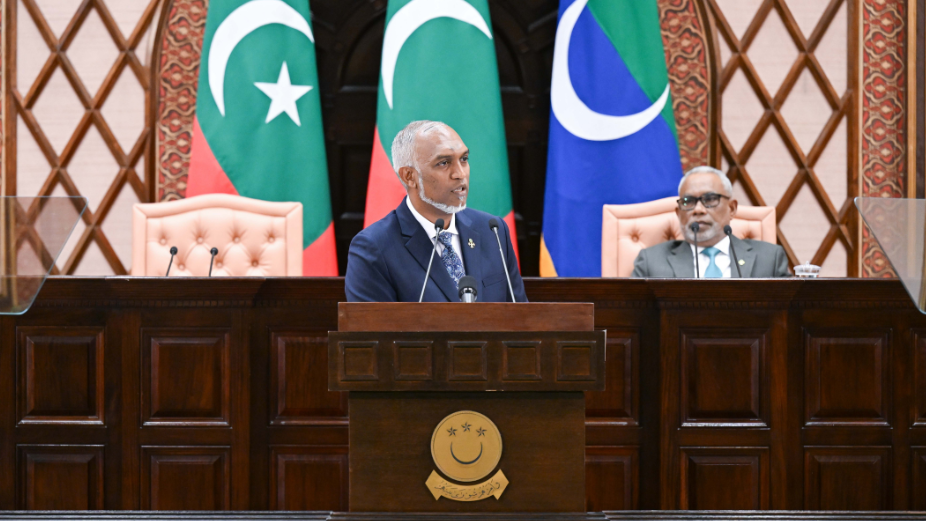
President Dr Mohamed Muizzu delivered his Presidential Address at the opening session of the People’s Majlis for 2025, outlining his government’s approach to economic development. His remarks touched on various aspects of the economy, including financial stability, investment incentives, tourism expansion, infrastructure, and digital transformation.
Economic Growth and Currency Stability
President Muizzu projected that the Maldivian economy would grow by 6.4 per cent in 2025, driven by tourism, infrastructure projects, and increased investment. He also emphasised the importance of preserving the value of the Maldivian rufiyaa, noting that foreign exchange law would bring stability to the dollar market.
A key measure announced was the plan for state-owned enterprises to access dollars at the official exchange rate from September 2025, rather than relying on the parallel market. The government also intends to increase the amount of dollars issued to banks for telegraphic transfers (TT) in 2026 to ease import-related transactions for local businesses.
State Revenue and Fiscal Management
The President stated that MVR 39.8 billion in revenue and grants are expected in 2025. He acknowledged that while revenue collection has improved, government spending continues to outpace earnings, requiring cost-cutting measures to reduce the deficit and government borrowing.
Investment and Tourism Growth
President Muizzu highlighted that changes to the Foreign Investment Act last year were a crucial step in making the Maldives a more attractive destination for investors. The government is pushing for increased private sector participation, particularly in tourism and infrastructure.
Tourism remains central to the economy, with the government targeting 2.3 million tourist arrivals by the end of 2025. To achieve this, efforts are underway to expand resort development in previously undeveloped atolls and improve direct flight connectivity to key markets, particularly in Europe and China. The new wide-body aircraft, which was added to the national airline’s fleet last October, will allow for direct flights to additional European destinations.
Infrastructure and Public Services
Infrastructure remains a government priority, with ongoing projects including harbour development, water and sanitation systems, and banking accessibility. By the end of this year, ATM services will be available on every inhabited island, provided by the Bank of Maldives and the Maldives Islamic Bank.
In efforts to improve water security in Malé, the President announced that a pipeline installed on the Sinamalé Bridge will be operational this year to boost the city’s water supply. Water production in Malé is set to increase by 25 per cent, with storage capacity rising by 30 per cent.
Support for Local Businesses and Agriculture
Small and medium enterprises (SMEs) were also mentioned, with the President stating that MVR 198 million was disbursed to 374 businesses over the past year. Additionally, repayment terms for COVID-19-related loans have been adjusted to ease the burden on affected businesses.
On agriculture, the government aims to transform the sector into a key economic pillar, announcing plans to establish a Special Economic Zone (SEZ) for agriculture. The project aims to ensure domestic production of essential crops, with completion targeted for 2028.
Digital Transformation and ICT Expansion
Muizzu reaffirmed his administration’s focus on digital transformation, stating that by 2030, the ICT sector should contribute 15 per cent of the country’s economic output. Key initiatives include digital identity cards, improved cybersecurity, and a data-sharing platform. The President referenced his visit to Estonia as a model for the Maldives’ digital ambitions.
Future Economic Challenges
While the President projected a positive outlook, he acknowledged economic risks such as foreign exchange volatility, high government expenditure, and the need for greater private sector participation. The government’s ability to manage inflation and maintain fiscal discipline will be critical in determining the success of these economic policies.
As President Muizzu’s administration moves forward with these plans, the impact on businesses, investors, and the general public remains to be seen.












